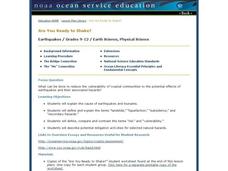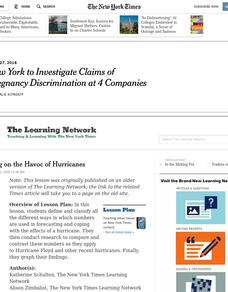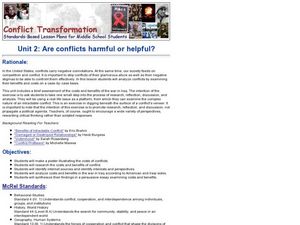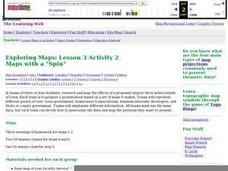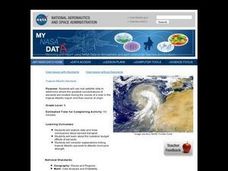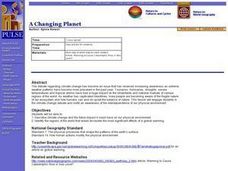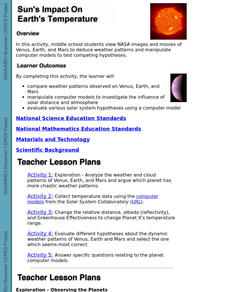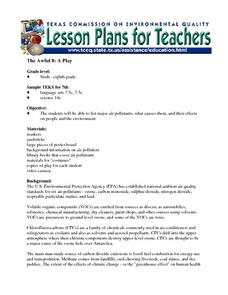Curated OER
Tsunami - Five Years On
Students explore the issues of rebuilding after the Indonesian tsunami. In this reconstruction lesson, students investigate the reconstruction that followed the devastating event.
Curated OER
Tracking Hurricanes
Students explore how technology and science are used to identify, measure, and track powerful tropical storms to better warn and secure people from their impact. They research hurricanes online by tracking the storms on a hurricane website.
Curated OER
Are You Ready to Shake
Learners examine earthquakes and tsunamis. In this Earth science lesson plan, students investigate the causes and hazards associated with earthquakes and tsunamis.
Curated OER
Student Meteorologists
Students examine and use basic weather equipment and concepts and create a weather forecast. They then incorporate technology effectively into their forecast. Students use a students's trade book as a substitute for the textbook.
Curated OER
Counting on the Havoc of Hurricanes
Students define and classify all the different ways in which numbers are used in forecasting and coping with the effects of a hurricane. They conduct research to compare and contrast these numbers as they apply to Hurricane Floyd and
Curated OER
Temperature in the Sun or Shade of the Desert
Third graders use thermometers to measure the air temperature in several
places around the school and then return to the classroom to record the data. They create a bar graph and discuss their findings about the air temperature in the...
Curated OER
Our Desert Backyard
Students make observations of their own backyard. In this environment lesson, students keep records of the plants and animals they see in their home or school yard. Students make notes of how the weather and environment changes over...
Curated OER
Awesome Adaptations!
Second graders explore biology by researching animal characteristics. For this adaptation lesson, 2nd graders identify the history of several animals and research the changes that have occurred to their anatomy over thousands of years....
Curated OER
Rain On
Fourth graders study the water cycle and clouds. In this water cycle and cloud lesson, 4th graders determine the definition of condensation and watch a demonstration in which the teacher makes a cloud in a bottle. They discuss the water...
Curated OER
Conflict Transformation
Students analyze the usefulness of conflict. In this conflict resolution lesson, students will examine several real life conflict scenarios. Students will analyze these conflicts in terms of there costs and benefits to determine weather...
Curated OER
Maps with a "Spin"
Students, in groups, research and map the effects of a proposed airport three miles outside of town. They prepare a presentation based on a set of maps they make and explains its different points of view from the viewpoints of the town...
Curated OER
Tracking the Storm
Young scholars discuss the different types of storms that can hit land. They locate specific coordinates on a plane grid. They discuss lonsgitude and latitude to plot the coordinates of a tropical storm. They practice finding...
Curated OER
Earth's Water
If the majority of our planet is covered with water, why do we need to bother conserving it? With a thorough and varied investigation into the location and types of water on the earth, learners will gain an understanding of why this...
Columbus City Schools
Biome Basics with a Disastrous Twist
Bored with your current biome bag of tricks? This bundle is a bountiful bag of biome fun! Travel the globe with seventh graders and explore the biotic and abiotic factors that define our world's biomes. Then, introduce a little chaos to...
Curated OER
Troical Atlantic Aerosols
Students explore the effect aerosols have upon he weather and climate. They observe NASA satellite images to explore and draw conclusions about aerosol transport. From studying the images, students track the path of aerosols. They...
Curated OER
A Changing Planet
Young scholars describe climate change and the future impact it could have on our physical environment. They identify the regions of the world that would encounter the most significant effects of a global warming.
Curated OER
Extreme Climate
Students discuss global warming, greenhouse effect, permafrost and other key words. In this climate instructional activity students create a web that connects global warming, the Arctic and world climate then write a paragraph...
Curated OER
Hurricanes
Students perform various experiments to explore hurricanes. In this earth science lesson, students explain how they form. They identify the structure of a hurricane.
Curated OER
How Did This Happen?
Pupils use websites and discussion to investigate the 2004 Asian Tsunami. Students identify the Indian Ocean coastline's physical, political and human geography features and consider how they affected loss of life and property in those...
Curated OER
Calm After the Storm
Young scholars create posters providing information about Sri Lanka's history and society both before and after the tsunami. They write response papers considering the future of this small country devastated by the natural disaster.
Curated OER
Sun's Impact On Earth's Temperature
Students view NASA images and movies of Venus, Earth, and Mars to deduce weather patterns and manipulate computer models to test competing hypotheses. They manipulate computer models to investigate the influence of solar distance and...
Curated OER
What is Drought?
Students explore and conduct an experiment on the effects of drought on the environment. They define what drought is and the impact that a shortage of rainfall can have on agriculture, municipal water supplies, tourism, recreation, etc.
Curated OER
The Awful 8: A Play
Students perform a play that presents the causes and effects on people and the environment of the eight major air pollutants.
Curated OER
Avoiding Sports Injuries
Students research sports injuries and how to deal with the injury. In this injury prevention lesson, the teacher introduces several exercise risk factors and prevention techniques, then students work in small groups to conduct research...




